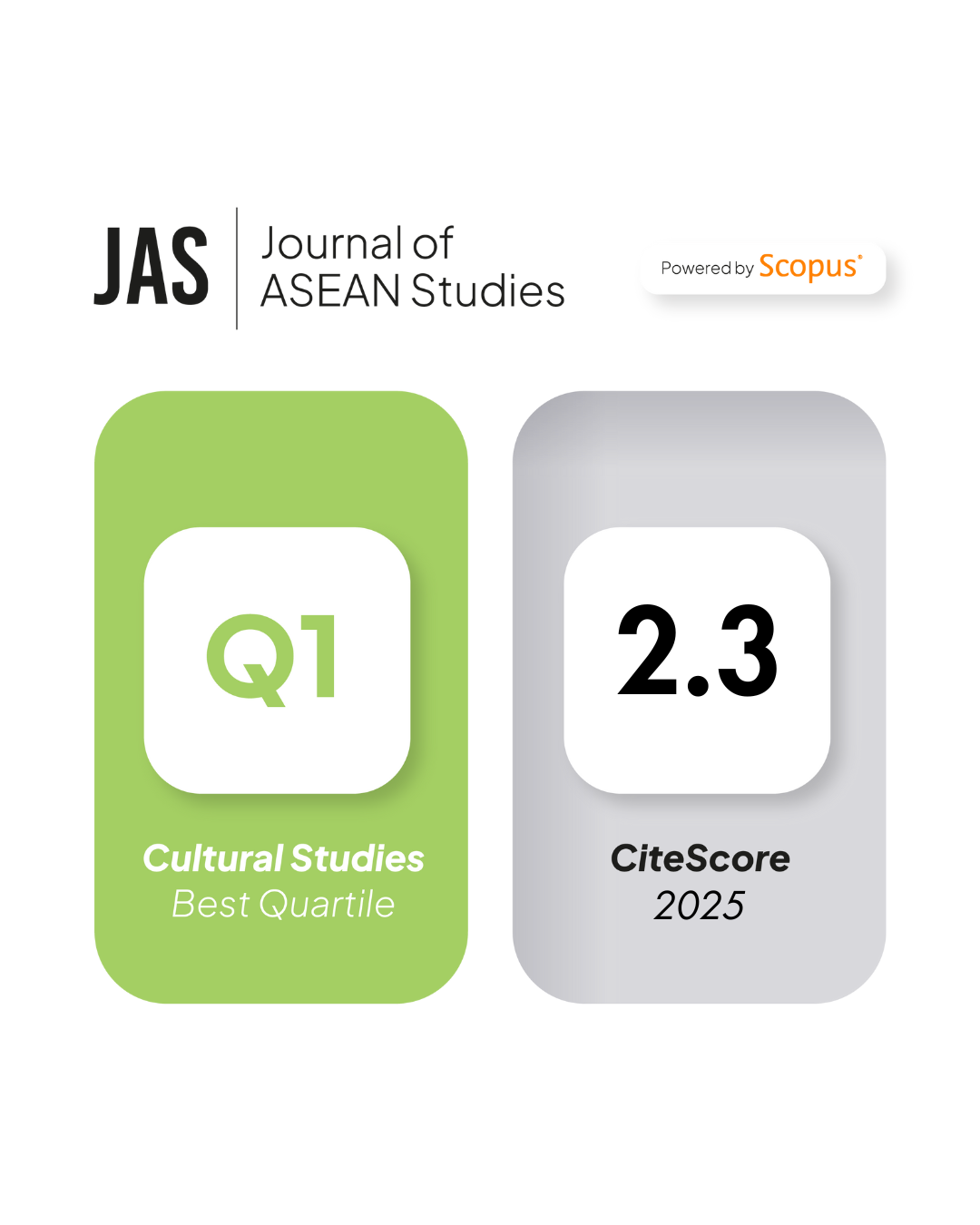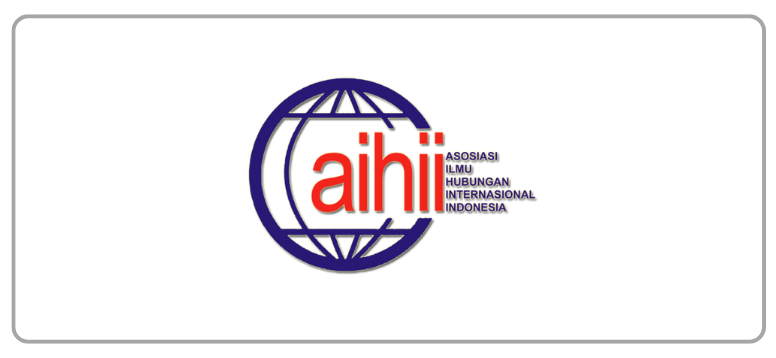Regionalism under Challenge: Ideas and Joko Widodo's Foreign Policy towards ASEAN, 2014-2019
DOI:
https://doi.org/10.21512/jas.v8i2.6596Keywords:
Indonesia’s foreign policy, Joko Widodo, ASEAN, causal beliefs, road mapAbstract
Indonesia’s foreign policy under Joko Widodo ‘Jokowi’ has significantly shifted compared with his predecessor’s era, especially regarding policies on regionalism. While former President Susilo Bambang Yudhoyono emphasises multilateralism with a particular focus on ASEAN, Jokowi’s administration tends to overlook ASEAN as a multilateral organization. The research investigates the causal root of the tendency by using the concept of ideas in foreign policy. The results argue that the diminished role of Indonesia in ASEAN, especially during the first term of Jokowi’s presidency, is strongly influenced by causal beliefs held by Indonesian political elites and presidential advisors. Despite varying from one individual to another, these ideas have similar characteristics in proposing that Indonesia should expand its concentric circle beyond ASEAN, arguing that ASEAN is intrinsically weak and thus can no longer accommodate Indonesian aspirations. This idea acts as a road map that defines Indonesia’s national interests amid international politics dynamics in the 21st century.
References
Acharya, A. (2014). Indonesia Matters: Asia’s Emerging Democratic Power. Singapore: World Scientific.
Adler, E. (1992). The emergence of cooperation: National epistemic communities and the international evolution of the idea of nuclear arms control. International Organization, 46(1), 101-145. https://doi.org/10.1017/S0020818300001466
Allison, G. (1971). Essence of Decision: Explaining the Cuban Missile Crisis. Boston: Little, Brown and Company.
Anggaran dasar dan anggaran rumah tangga Partai Demokrasi Indonesia Perjuangan tahun 2019-2024. (2019, November 6). PDI Perjuangan. https://www.pdiperjuangan.id/article/category/child/28/Partai/AD/ART
Anwar, D. F. (1994). Indonesia in ASEAN: Foreign Policy and Regionalism. Singapore: ISEAS.
Anwar, D. F. (2005). Indonesia at Large: Collected Writings on ASEAN, Foreign Policy, Security and Democratisation. Jakarta: The Habibie Center.
Anwar, D. F. (2013). Transformasi politik luar negeri bebas-aktif Indonesia dalam menjawab kompleksitas tantangan global. Conference Commemorating 65 Years of Indonesia’s ‘Free and Active’ Foreign Policy, Universitas Gadjah Mada, Yogyakarta, 2 September.
Arif, M. (2015, n.d). Indonesia’s new ASEAN foreign policy. The Habibie Center. https://thcasean.org/read/articles/261/Indonesias-New-ASEAN-Foreign-Policy
ASEAN (2016, July 25). Joint Communiqué of the Foreign Ministers of ASEAN Member States on the Maintenance of Peace, Security and Stability in the Region. https://asean.org/wp-content/uploads/2016/07/Joint-Statement-of-the-Foreign-Ministers-of-AMS-on-the-Maintenance-of-Peace-Security-and-Stability-in-the-Region-AGREED.pdf
ASEAN tetap prioritas politik luar negeri Indonesia. (2015, January 8). Tribun News. http://www.tribunnews.com/nasional/2015/01/08/asean-tetap-prioritas-politik-luar-negeri-indonesia/
Berger, T. (1996). Norms, identity, and national security in Germany and Japan. In P. Katzenstein (Eds.), The Culture of National Security: Norms and Identity in World Politics (pp. 317-356). New York: Columbia University Press.
Bertemu Thein Sein, Presiden Jokowi: Indonesia tetap menjadi sahabat Myanmar. (2014, November 12). Cabinet Secretariat of the Republic of Indonesia. http://setkab.go.id/bertemu-thein-sein-presiden-jokowi-indonesia-tetap-menjadi-sahabat-myanmar/
Campbell, J. (1998). Institutional analysis and the role of ideas in political economy. Theory and Society, 27(3), 377-409. http://webuser.bus.umich.edu/organizations/smo/protected/resources/campbell98.pdf
Campbell, J. (2002). Ideas, politics, and public policy. Annual Review of Sociology, 28, 21-38. https://doi.org/10.1146/annurev.soc.28.110601.141111
Campbell, J. (2008). What do we know – or not – about ideas and politics? In P. Nedergaard & J. Campbell (Eds.), Politics and Institutions (pp. 157-176). Copenhagen: DJØF Publishers.
Carlsnaes, W. (1993). On analysing the dynamics of foreign policy change: A critique and reconceptualization. Cooperation and Conflict, 28(1), 5-30. https://doi.org/10.1177/0010836793028001001
Chacko, P. (2018). Foreign policy, ideas, and state-building: India and the politics of international intervention. Journal of International Relations and Development, 21, 346-371. https://doi.org/10.1057/jird.2016.15
Connelly, A. L. (2014). Indonesian foreign policy under President Jokowi. Lowy Institute. http://www.lowyinstitute.org/sites/default/files/indonesian-foreign-policy-under-president-jokowi_0_0.pdf
Connelly, A. (2016, December 5). Indonesia in the South China Sea: Going it alone. Lowy Institute. https://www.lowyinstitute.org/publications/indonesia-south-china-sea-going-it-alone
Cook, M. (2016, May 10). Duterte, Jokowi, and ASEAN. ISEAS. https://www.iseas.edu.sg/medias/commentaries/item/3072-duterte-jokowi-and-asean.
Dinarto, D. (2017, March 9). Is Indonesia choosing Indian Ocean Rim Association over ASEAN? The Diplomat. http://thediplomat.com/2017/03/is-indonesia-choosing-the-indian-ocean-rim-association-over-asean/
Eastwood, J. (2005). The role of ideas in Weber’s theory of interests. Critical Review, 17(1-2), 89-100. https://doi.org/10.1080/08913810508443629
Emmers, R. (2014). Indonesia’s role in ASEAN: A case of incomplete and sectorial leadership. Pacific Review, 27(4), 543-562. https://doi.org/10.1080/09512748.2014.924230
Finnemore, M. (1996). National Interests in International Society. Ithaca: Cornell University Press.
Flibbert, A. (2006). The Road to Baghdad: Ideas and intellectuals in explanations of the Iraq war. Security Studies, 15(2), 310-352. https://doi.org/10.1080/09636410600829570
Goldstein, J. and Keohane, R. (1993). Ideas and Foreign Policy: Beliefs, Institutions, and Political Change. Ithaca: Cornell University Press.
Govt proposes strengthening regional architecture in Indo-Pacific. (2018, February 7). Tempo.co. https://en.tempo.co/read/news/2018/02/07/055915533/Govt-Proposes-Strengthening-Regional-Architecture-in-Indo-Pacific
Gustavsson, J. (1999). How should we study foreign policy change? Cooperation and Conflict, 34(1), 73-95. https://doi.org/10.1177/00108369921961780
Hass, P. (1992). Banning chlorofluorocarbons: Epistemic community efforts to protect stratospheric ozone. International Organization, 46(1), 187-224. https://doi.org/10.1017/S002081830000148X
Heiduk, F. (2016, May 3). Finding regionalism in Jokowi’s foreign policy. The Diplomat. https://thediplomat.com/2016/05/finding-regionalism-in-jokowis-foreign-policy/
Hermann, C. (1990). Changing course: When governments choose to redirect foreign policy. International Studies Quarterly, 34(1), 3-21. https://doi.org/10.2307/2600403
Hill, C. (2003). The Changing Politics of Foreign Policy. New York: Palgrave Macmillan.
Hook, S. (2008). Ideas and Change in U.S. Foreign Aid: Inventing the Millennium Challenge Corporation. Foreign Policy
Analysis, 4(2), 147-167. https://doi.org/10.1111/j.1743-8594.2007.00062.x
Hudson, V. (2014). Foreign Policy Analysis: Classic and Contemporary Theory (2nd Ed.). Lanham: Rowman & Littlefield.
Huntington, S. (2002). The Clash of Civilization and the Remaking of World Order (3rd Ed.). Yogyakarta: Qalam.
Ipek, P. (2013). Ideas and change in foreign policy instruments: Soft power and the case of the Turkish International Cooperation and Development Agency. Foreign Policy Analysis, 11(2), 1-21. http://yoksis.bilkent.edu.tr/pdf/files/6950.pdf
Jakarta Globe (2017, January 22). Luhut Panjaitan on Indonesia-ASEAN role in South China Sea. https://www.youtube.com/watch?v=xKRK350918s
Jokowi bertemu PM Abe jelang KTT ASEAN di Manila. (2017, November 12). Liputan6. http://news.liputan6.com/read/3160130/jokowi-bertemu-pm-abe-jelang-ktt-asean-di-manila
Kitchen, N. (2010). Systemic pressures and domestic ideas: A neoclassical realist model of grand strategy formation. Review of International Studies, 36(1), 117-143. https://doi.org/10.1017/S0260210509990532
Kissinger, H. (1994). Diplomacy. New York: Simon & Schuster.
Legro, J. (2005). Rethinking the World: Great Power Strategies and International Order. Ithaca: Cornell University Press.
Leifer, M. (1989). Indonesian Foreign Policy. Jakarta: Gramedia.
Luhulima, C. P. F. (2013, February 7). Indonesia and ASEAN beyond 2014. The Jakarta Post. http://www.thejakartapost.com/news/2013/02/07/indonesia-and-asean-beyond-2014.html/
Marsudi, R. L. P. (2017a, January 10). Pernyataan pers tahunan Menteri Luar Negeri Republik Indonesia Ministry of Foreign Affairs of the Republic of Indonesia. https://kemlu.go.id/portal/id/read/757/pidato/pernyataan-pers-tahunan-menteri-luar-negeri-ri-tahun-2017
Marsudi, R. L. P. (2017b, April 25). 50 Tahun ASEAN. Kompas. https://nasional.kompas.com/read/2017/04/25/21002191/50.tahun.asean?page=all
Marsudi, R. L. P. (2018, January 9). Pernyataan pers tahunan Menteri Luar Negeri Republik Indonesia. Ministry of Foreign Affairs of the Republic of Indonesia. https://kemlu.go.id/portal/id/read/758/pidato/pernyataan-pers-tahunan-menteri-luar-negeri-ri-tahun-2018/
Martin, L. (1992). Institutions and cooperation: Sanctions during the Falkland Islands conflict. International Security, 16(4), 143-178. https://doi.org/10.2307/2539190
Mintz, A. and DeRouen, K. (2010). Understanding Foreign Policy Decision Making. Cambridge: Cambridge University Press.
Natalegawa, M. (2018). Does ASEAN Matter? A View from Within. Singapore: ISEAS.
Neack, L. (2008). The New Foreign Policy: Power Seeking in a Globalized World. Lanham: Rowman & Littlefield.
Poole, A. (2015, September 7). Is Jokowi turning his back on ASEAN? The Diplomat. http://thediplomat.com/2015/09/is-jokowi-turning-his-back-on-asean/
Presiden Jokowi: MEA harus dihadapi. (2015, November 22). CNN Indonesia. https://www.cnnindonesia.com/ekonomi/20151122133039-92-93278/presiden-jokowi-mea-harus-dihadapi/
Price, R. (1995). A genealogy of chemical weapons taboo. International Organization, 49(1), 73-103. https://doi.org/10.1017/S0020818300001582
Rosyidin, M. and Andika, M. T. (2017). Indonesia dalam Pusaran Global: Politik Luar Negeri Susilo Bambang Yudhoyono. Yogyakarta: Pustaka Ilmu.
Rosyidin, M. (2014). Kembali ke masa depan? Membaca arah politik luar negeri Jokowi dan prospek Indonesia menjadi kekuatan global. Konvensi V Asosiasi Ilmu Hubungan Internasional Indonesia (AIHII), Universitas Budi Luhur, Jakarta, 25-28 November.
Rosyidin, M. (2016a). Mencari identitas politik luar negeri Indonesia kontemporer. Analisis CSIS, 45(1), 77-94.
Rosyidin, M. (2016b). Konflik natuna dan kebijakan Realpolitik Indonesia. Analisis CSIS, 45(4), 367-380.
Rosyidin, M. (2017a). Foreign policy in changing global politics: Indonesia’s foreign policy and the quest of major power status amidst Asian Century. South East Asia Research, 25(2), 1-17. https://doi.org/10.1177/0967828X17706570
Rosyidin, M. (2017b). Why is ASEAN important to Indonesia? Indonesian Quarterly, 45(3), 222-243.
Salim, T. (2016, July 26). Joint communique proof of ASEAN’s unity: Retno. The Jakarta Post. http://www.thejakartapost.com/news/2016/07/26/joint-communiqu-proof-of-aseans-unity-retno.html/
Sandal, N. A. and Fox, J. (2013). Religion in International Relations Theory: Interactions and Possibilities. London: Routledge.
Setiawan, A. (2014, November 14). Pidato lengkap Jokowi di KTT ASEAN soal poros maritim. VIVA News. http://www.viva.co.id/berita/dunia/558043-pidato-lengkap-jokowi-di-ktt-asean-soal-poros-maritim
Setiawan, A. (2015, March 25). About the South China Sea, President Jokowi affirms the readiness of Indonesia becomes mediator. Cabinet Secretariat of the Republic of Indonesia. https://setkab.go.id/en/about-the-south-china-sea-president-jokowi-affirms-the-readiness-of-indonesia-becomes-mediator/
Shekhar, V. (2015, September 30). Realist Indonesia’s drift away from ASEAN. Asia Pacific Bulletin, No. 32. https://www.eastwestcenter.org/system/tdf/private/apb323.pdf?file=1&type=node&id=35328
Singh, D. and Cook, M. (2017). Southeast Asian Affairs 2017. Singapore: ISEAS.
Snyder, R., Brucks, H. W. and Sapin, B. (1961). The decision-making approach to the study of International Politics. In J. Rosenau (Eds.), International Politics and Foreign Policy: A Reader in Research and Theory (pp. 199-206). New York: Free Press.
SOM ASEAN bahas tantangan baru dunia di Bali. (2016, December 12). Nusa Kini. https://www.nusakini.com/news/som-asean-bahas-tantangan-baru-dunia-di-bali
Sukma, R. (2009a, June 30). Indonesia needs a post-ASEAN foreign policy. The Jakarta Post. http://www.thejakartapost.com/news/2009/06/30/indonesia-needs-a-postasean-foreign-policy.html.
Sukma, R. (2009b, October 5). A post-ASEAN foreign policy in the post-G8 world. The Jakarta Post. http://www.thejakartapost.com/news/2009/10/05/a-postasean-foreign-policy-a-postg8-world.html.
Sukma, R. (2012). Domestic Politics and International Posture: Constraints and Possibilities. In A. Reid (Eds.), Indonesia Rising: The Repositioning of Asia’s Third Giant (pp. 77-92). Singapore: ISEAS.
Sukma, R. (2014, August 21). Gagasan poros maritim. Kompas. http://ekonomi.kompas.com/read/2014/08/21/080000726/Gagasan.Poros.Maritim
Sukoyo, Y. (2014, September 5). Andi Widjajanto, terdepan membela visi-misi Jokowi. Berita Satu.
http://www.beritasatu.com/politik/207984-andi-widjajanto-terdepan-membela-visimisi-jokowi.html
Suryadinata, L. (1998). Politik Luar Negeri Indonesia di bawah Soeharto. Jakarta: LP3ES.
Syailendra, E. A. (2015, February 2). Consensual leadership in ASEAN: Will it endure under Jokowi? Fair Observer. https://www.fairobserver.com/region/asia_pacific/consensual-leadership-asean-will-endure-jokowi-02487/
Syailendra, E. A. (2016, August 18). President’s special relationship with Luhut Panjaitan. RSIS Commentary. https://www.rsis.edu.sg/wp-content/uploads/2016/08/CO16209.pdf
Tan, S. S. (2015). Indonesia among the powers: Will ASEAN still matter to Indonesia? In C. Roberts, A. Habir, and L. Sebastian (Eds.), Indonesia’s Ascent: Power, Leadership, and the Regional Order (pp 287-307). New York: Palgrave Macmillan.
Tannenwald, N. (2005). Stigmatizing the bomb: Origins of the nuclear taboo. International Security, 29(4), 5-49. https://doi.org/10.1162/isec.2005.29.4.5
Taw, N. P. (2014a, November 12). Pidato lengkap Jokowi di KTT ASEAN. Detik News. https://news.detik.com/berita/2746554/pidato-lengkap-jokowi-di-ktt-asean
Taw, N. P. (2014b, November 13). Bertemu Sekjen PBB, Jokowi tegaskan dukungan untuk Palestina. Detik News. https://news.detik.com/berita/d-2746972/bertemu-sekjen-pbb-jokowi-tegaskan-dukungan-untuk-palestina/
Thorun, C. (2008). Explaining Change in Russian Foreign Policy: The Role of Ideas in Post-Soviet Russia’s Conduct towards the West. Basingstoke: Palgrave Macmillan.
Umar, A. R. M. (2016, December 5). Where is ASEAN in Indonesia’s foreign policy? Jokowi after two years. ASEAN Studies Center. http://asc.fisipol.ugm.ac.id/where-is-asean-in-indonesias-foreign-policy-jokowi-after-two-years/
Weatherbee, D. (2013). Indonesia in ASEAN: Vision and Reality. Singapore: ISEAS.
Weatherbee, D. (2016). Re-Assessing Indonesia’s Role in the South China Sea. ISEAS, 18. https://www.iseas.edu.sg/images/pdf/ISEAS_Perspective_2016_18.pdf
Wendt, A. (1999). Social Theory of International Politics. Cambridge: Cambridge University Press.
Widjajanto, A. (2013, February 18). Transisi hegemonik dan postur pertahanan. Rumah Opini. https://lautanopini.wordpress.com/2013/02/18/transisi-hegemonik-dan-postur-pertahanan/
Widodo, J. and Kalla, J. (2014). Jalan Perubahan untuk Indonesia yang Berdaulat, Mandiri dan Berkepribadian. Jakarta: Komisi Pemilihan Umum.
Willis, D. (2017, March 14). Indonesia’s choice: Not the Indian Ocean, but bilateralism. The Diplomat. http://thediplomat.com/2017/03/indonesias-choice-not-the-indian-ocean-but-bilateralism/
Yahya, T. (2015a, June 1). Has Jokowi put ASEAN on the sidelines? The Jakarta Post. http://www.thejakartapost.com/news/2015/06/01/has-jokowi-put-asean-sidelines.html
Yahya, T. (2015b, June 4). Cara Jokowi melihat ASEAN. SindoNews.com. https://nasional.sindonews.com/read/1008585/18/cara-jokowi-melihat-asean-1433384504.
Yates, R. (2017). ASEAN as the ‘Regional Conductor’: Understanding ASEAN’s role in the Asia-Pacific order. Pacific Review, 30(4), 443-461. https://doi.org/10.1080/09512748.2016.1264458
Yates, R. (2019). Understanding ASEAN’s Role in the Asia-Pacific Order. Cham: Palgrave Macmillan.
Yee, A. (1996). The causal effect of ideas on policies. International Organization, 50(1), 69-108. https://doi.org/10.1017/S0020818300001673
Downloads
Published
How to Cite
Issue
Section
License
Copyright (c) 2020 Mohamad Rosyidin, Shary Charlotte H. Pattipeilohy

This work is licensed under a Creative Commons Attribution-NonCommercial 4.0 International License.


























